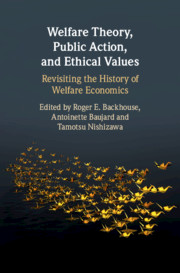Book contents
- Welfare Theory, Public Action, and Ethical Values
- Welfare Theory, Public Action, and Ethical Values
- Copyright page
- Contents
- Figures and Tables
- Contributors
- Acknowledgements
- Introduction: Revisiting the History of Welfare Economics
- Part I Plurality of Welfare in the Making of Welfare Economics
- Part II Developing Modern Welfare Economics
- 7 John Hicks’s Farewell to Economic Welfarism
- 8 Individualism and Ethics
- 9 Non-welfarism in the Early Debates over the Coase Theorem
- 10 Musgrave and the Idea of Community
- 11 Non-welfaristic Features of Kenneth Arrow’s Idea of Justice
- 12 Beyond Welfarism
- 13 The Influence of Sen’s Applied Economics on His Non-welfarist Approach to Justice
- 14 Conclusion
- Index
- References
12 - Beyond Welfarism
The Potential and Limitations of the Capability Approach*
from Part II - Developing Modern Welfare Economics
Published online by Cambridge University Press: 04 March 2021
- Welfare Theory, Public Action, and Ethical Values
- Welfare Theory, Public Action, and Ethical Values
- Copyright page
- Contents
- Figures and Tables
- Contributors
- Acknowledgements
- Introduction: Revisiting the History of Welfare Economics
- Part I Plurality of Welfare in the Making of Welfare Economics
- Part II Developing Modern Welfare Economics
- 7 John Hicks’s Farewell to Economic Welfarism
- 8 Individualism and Ethics
- 9 Non-welfarism in the Early Debates over the Coase Theorem
- 10 Musgrave and the Idea of Community
- 11 Non-welfaristic Features of Kenneth Arrow’s Idea of Justice
- 12 Beyond Welfarism
- 13 The Influence of Sen’s Applied Economics on His Non-welfarist Approach to Justice
- 14 Conclusion
- Index
- References
Summary
The capability approach is widely considered to be a promising alternative to welfarist approaches in welfare economics. Indeed, prominent criticism of the informational basis of utilitarianism and resource-based approaches in welfare economics and political philosophy stand at the origins of the approach. What is not straightforward is whether the capability approach can indeed overcome the problems that motivated its origins. This chapter discusses the latter issue, covering the intrinsic importance of freedom, issues of preference adaptation and the neglect of diversity linked to paternalism. Drawing both on the wide diversity of the literature on capabilities and on the axiomatic literature on freedom rankings, we show that the characteristic features of the capability approach are not enough to respect these three criteria together. We conclude that any promising non-welfarist approach will require further scrutiny of the conceptualisation of freedom, and the modalities of application of value pluralism.
Keywords
- Type
- Chapter
- Information
- Welfare Theory, Public Action, and Ethical ValuesRevisiting the History of Welfare Economics, pp. 277 - 297Publisher: Cambridge University PressPrint publication year: 2021

